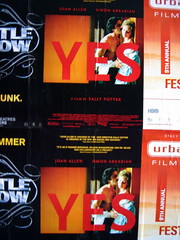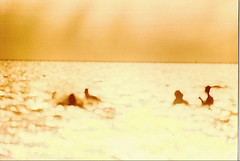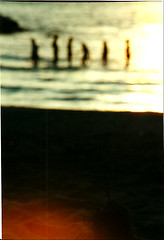Yes (2005)
Dir. Sally Potter
Writ. Walter Donohue, Sally Potter
w/ Joan Allen, Simon Abkarian, Sam Neill, Shirley Henderson
Before the young lovers set eyes on each other, the houses of Montague and Capulet had sealed Romeo and Juliet's fate. That sixteenth century prism of an unobtainable co-existence of peace and love sets the proscenium for Sally Potter's (Orlando) heady exposure of modern conflict as laid between two souls, Yes.
A middle-Eastern man takes daily affronts to his pride in a London kitchen. A scientist from Belfast vis-a-vis America, long fallen out of pleasure with an absent husband, explores the capacity of living cells to discern their destinies. They meet, partaking of a private intimacy just beyond the noses of the surrounding public, and all the tumblers unlock. Amid an interracial argument about to come to blows, the cook loses his job and he breaks off the romance and retreats to Beirut where he reclaims his original profession as a surgeon. Meanwhile, her marriage untenable, the woman who raised her dying, the scientist reaches out to him, unwilling to part ways despite the grief and despair.
The choices Potter's subjects make both visible and audible, she reveals these hidden lives with a piquantly honest social acumen, contrasting them through a variety of means. Whether or not to voice fears, who to confide in, and when to keep secrets secret comprise Yes's core. As the determined heroine, Joan Allen waxes and wanes with more juice than usual. Parisian theatre production company owner and co-star Simon Akbarian presents a persuasive stage charisma with a loyalty to the verse that unfolds the tale. Although his approach translates to film as threadbare at turns, he plays off Allen's feminine sense of creature character with such skill that the decision's overlookable, more so than the stilted lines of the supporting cast, especially the kitchen crew. His mysteriousness and instinctual timing produce an exotic masculinity that emaciates only marginally when confronted with his insecurities.
In keeping with the erotically charged atmosphere, Potter also scribbled in the housekeeper, whose musings both tantalize and give pause for reflection. "Dirt never really goes away," she says, "It just gets pushed around." Like all living cells with a destination, she minimizes her role in the play, making herself very small yet resourceful. Fishing a condom from a toilet and carrying away stained sheets, her observations bring marked heat to an existence rife with infidelities for all the right reasons, not to mention the strains on a man who would like to be rid of the third wheel as much as he would his third-world image. Two people can't hold each other responsible for all the wrongs of the world, but love does tend to leave its targets vulnerable to all.
Raw and vital, Yes shares the soil of human thought in textured transitions that vary from nickelodeon epiphanies to deep sea swells, just like the gamet of human emotion. Totally aware of the horrors constantly impeding the planet, Potter reaffirms the diminishing line between objectivity and individual perspective. Since human understanding will always be subject to interpretation, objectivity can never be isolated and defined. All anyone can ever do is try, whether she be a scientist devoted to quantification or a man obsessed with his identity.
Unlike the bard's ill-fated lovers, the scientist and the cook-cum-doctor choose to live in this uneasy world, not without fear. The tides have shifted since the days of Capulet and Montague. Their ultimate separation gains no peace, bridges no cultural gaps. Their destiny lies bound together, as intertwined as the futures of all nations; such is Potter's vision for peace, one of the most recommendable in years.
Parting may still be such sweet sorrow in the twenty-first century, but it can't be nearly as sweet as togetherness. Yes individually conquers the notion that everything must have a price, exhorting its audience to believe that, for once, this isn't just another movie, or even the stuff that dreams are made of, but that peace can be as free and clear as love.
Labels: Film, Reviews, Sally Potter















4 Comments:
this film is perhaps the hidden gem of 2005. nicely done
i'd like to think so. i loved Orlando and while I don't expect you to read my mind, I wish you had told me this was a Sally Potter vehicle...I would've watched it much sooner.
well, this is what i wrote in my top 10 of the year where i had Yes at #2:
starring: Joan Allen, Simon Abkarian, Sam Neill, and Shirley Henderson
written and directed by: Sally Potter
R, 100 min, UK/USA
Featuring dialogue written entirely in iambic pentameter and a virtuoso performance by Joan Allen, Sally Potter's Yes is a haunting, mesmerizing, and infinitely fascinating love story. With echoes of both Shakespeare and Eminem, this is the type of bold filmmaking we so rarely see. Potter takes chances at nearly every opportunity, and while they don't all work, they are all interesting, if not inspired. She seems to have no fear of failure, allowing her work the freedom to blossom with a strange beauty. It is by no means perfect, but makes a case for greatness, which is really all you can ask for.
wow.
ok, ok...so I scanned it.
shoddily, apparently.
I remembered this tidbit w/o the details, whereas had you told me...fyi, I have my quirks.
Post a Comment
<< Home